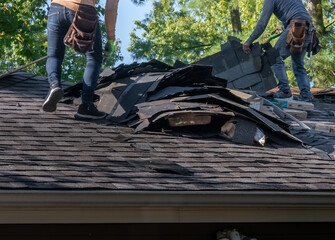Choosing a roofing contractor is one of the most important home improvement decisions you can make. Your roof is a major investment, and you deserve to work with an honest, reliable contractor.
 Local online reviews are a good indicator of how the company operates. Look for a roofing company with positive reviews from previous clients. Contact Bears Valley Roofing Company for professional help.
Local online reviews are a good indicator of how the company operates. Look for a roofing company with positive reviews from previous clients. Contact Bears Valley Roofing Company for professional help.
Working as a roofer can be an exciting and rewarding career. It offers many perks, including job security and great earning potential. It also provides independence and satisfaction of a job well done. However, roofing is not a career for everyone and requires physical endurance, focus on safety, and business acumen.
The first step to becoming a successful roofing contractor is gaining experience. This can be accomplished through internships, apprenticeships, or by shadowing a master roofer. During this time, you will learn the different aspects of roofing and develop a strong understanding of how to apply them to your own projects. You will also gain the necessary knowledge to develop a successful marketing strategy.
In addition to working on residential and commercial projects, roofing contractors are also required to maintain compliance with local building codes and regulations. This ensures that your project is completed correctly and prevents future legal issues. Additionally, roofing contractors must have knowledge of safety protocols and equipment to protect themselves and their crew members.
The best roofing companies create a work environment that is centered on respect and trust. They encourage their employees to be honest and open about their problems and mistakes without fear of repercussions. This helps to build a cohesive team that works together to solve problems and achieve success.
This course provides an overview of the various aspects of managing a roofing company, including company structure, market data, organizational missions, vision and values, roof specialization, location study, roof management, crew recruitment, quality and availability, and sales and marketing. It also covers the responsibilities of managers and explains how to build strong client relationships, prioritize employee safety, stay up-to-date with technological advancements, and cultivate a supportive culture.
License
Licensed roofing contractors are experts who ensure that buildings are watertight and sturdy enough to withstand various weather conditions. They may work on both residential and commercial structures, either as part of a company or on their own. They also build shingles and other types of roofing materials. Roofing is a physically demanding job that requires a high degree of strength and stamina. It involves climbing ladders, carrying heavy materials, and working in various weather conditions. It also poses many health risks, including falls from heights and injuries from tools.
Choosing the right contractor for your project is crucial. A licensed professional will ensure that your roof is installed according to building codes and will help you avoid costly legal complications. In addition, they are likely to have liability insurance and workers’ compensation coverage in case of any accidents on the job.
Most states and localities have online portals that allow homeowners to check a contractor’s license status. These websites are typically straightforward and allow users to enter a contractor’s name or license number. They then provide instant information about the contractor’s licensing status, including validity and expiration dates. They may also show whether the contractor has any disciplinary actions or complaints.
In order to become a licensed roofing contractor, applicants must pass an exam and prove that they have relevant experience. They also need to acquire a business license and submit proof of insurance. Applicants can also take courses at a trade school, such as Roofing Academy X, to learn more about roofing techniques and the necessary skills to get a job in this field.
Licensed roofing contractors can be found in every state. Most of them specialize in specific areas, such as shingle or metal roofing. They can also install heating, ventilation, and air-conditioning systems in homes or commercial buildings. However, if you want to install a new air conditioning system, you will need to obtain a class A air-conditioning license. This is because the license is required to work with asbestos. If you are planning to work with asbestos, you should consult a qualified professional.
Insurance
A roofing company that is insured shows that they take their responsibilities seriously and that they are invested in the safety of their employees and clients. They will also have the resources to address damage or accidents that occur on-site quickly and efficiently.
Workers’ Compensation Insurance is a legal requirement in most states and protects your roofing contractor if one of their employees is injured while working on the job. This coverage helps to pay for medical expenses, lost wages, and any legal fees that may arise from the injury. Ideally, roofing contractors will have this insurance as it’s a good way to demonstrate that they are dedicated to the safety of their employees and can handle any issues that might arise during a project.
General Liability Insurance is another important policy that helps to cover costs related to property damage, bodily injuries, and advertising injuries. Typically, this type of insurance is affordable for most roofing contractors as it only requires a small annual premium to obtain.
Inland Marine Insurance is a valuable asset for roofing companies as it covers tools and equipment that are in transit or stored off-site. For roofing contractors who often transport materials across NYC, this type of insurance is a must. The cost can range from a few hundred to a few thousand dollars annually depending on the value of your equipment.
If you have a business vehicle, like a truck or van, it is essential to have Commercial Auto Insurance. This coverage protects your roofing business against any damage or losses that might happen while you’re using a company-owned vehicle for work purposes. Generally, personal auto policies won’t cover business-related incidents, so having this type of protection is vital for your roofing business.
Roofing companies should also consider obtaining Contractors Pollution Liability Insurance. This coverage protects a roofing contractor from Bodily Injury and Property Damage claims that arise from the discharge, dispersal, migration, release, or escape of pollutants including gases, chemicals, hazardous substances, waste materials, and other contaminants. Typically, mold is covered by this policy as well.

